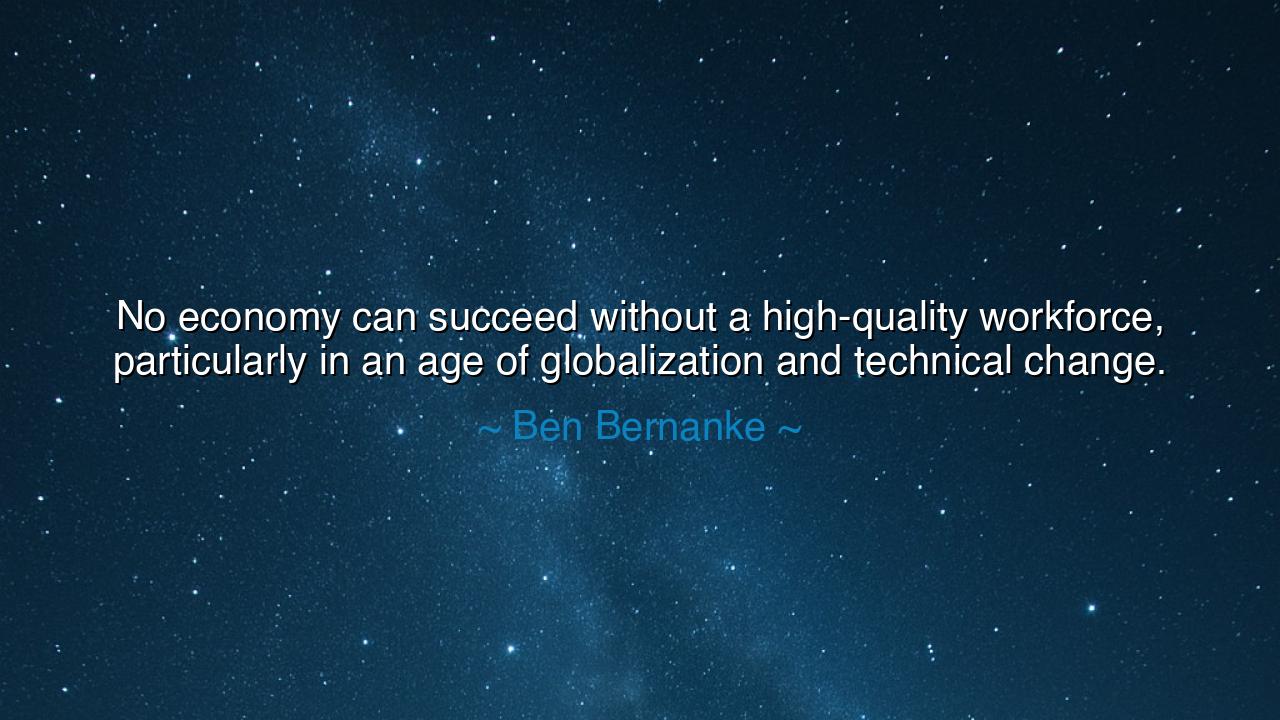
No economy can succeed without a high-quality workforce
No economy can succeed without a high-quality workforce, particularly in an age of globalization and technical change.






Listen, O children of the future, to the words of Ben Bernanke, a wise leader of our time, who spoke with clarity and foresight: "No economy can succeed without a high-quality workforce, particularly in an age of globalization and technical change." These words carry with them the pulse of a truth that stretches back to the dawn of civilization, when the prosperity of great empires—whether in the lands of Egypt, Rome, or China—depended not on the riches of the earth, but on the strength, ingenuity, and vitality of the people who worked within them. Workforce is not merely a collection of laborers; it is the very foundation upon which all progress is built. Without it, the most lavish cities would fall to ruin, and the brightest minds would never shine.
In the ancient world, the power of a nation was often measured by the skill and knowledge of its people. Athens, for example, was renowned not only for its wealth but for its flourishing of intellect and innovation. The philosophers of old, such as Socrates and Plato, were the architects of a mind that sought to understand the universe. But they were not alone in their pursuit—Athens succeeded because its people, from artisans to scholars, were empowered and educated. This unity of mind and labor is what gave Athens its strength. In the same way, Bernanke’s words remind us that the success of an economy is not just about material wealth, but about the quality of the people who drive it forward.
The lessons of history tell us that no empire, no matter how mighty, can withstand the tides of time if its people are not constantly evolving. Consider the rise and fall of the Roman Empire, which once stood as a beacon of power and culture. At its zenith, it was the brilliance of Roman engineers, lawmakers, and soldiers that allowed the empire to expand. But, as the centuries passed, the decline of education, the stagnation of skill, and the failure to adapt to changing times led to Rome’s fall. In contrast, when new empires like the British Empire rose, they too succeeded not merely through military might, but because of the innovation and adaptability of their people. These peoples were not just laborers, but creators, thinkers, and builders, equipped with the tools of both practical skill and intellectual might.
And so it is now, in our own age, an era marked by the ceaseless march of globalization and technical change. The world has shrunk, and the forces that govern it move faster than ever before. Where once kingdoms were built on vast lands or untold riches, now they rise and fall on the talent and knowledge of their people. The very fabric of economies is woven from the capabilities of those who work within them. A country may possess vast reserves of gold, oil, or other riches, but these will serve it little without the education, training, and creativity of the workers who extract and use them. As Bernanke wisely warns, no economy can succeed without a high-quality workforce, for this workforce is the key to navigating the ever-changing landscape of our interconnected world.
Take, for instance, the modern technological revolution that has transformed the world. In Silicon Valley, where the finest minds come together, the success of companies like Apple and Google did not rest on the machines alone, but on the visionary thinkers, the coders, and the engineers who shaped the future with their ideas. It is not enough to have wealth; the greatest wealth comes from the intellectual capital of those who can turn dreams into reality. Globalization means that every country, every economy, must compete on a level playing field, and the most successful nations will be those that prioritize the nurturing of a highly educated and skilled workforce.
But what, then, can we take from these timeless truths? The lesson is clear: education and training are the keys to success in any age, but they are particularly vital in the age we now live in. We must invest, O children, in the minds of the future. We must empower our youth, for they are the builders and innovators who will shape the world that is yet to come. The best economy is one that does not merely build monuments of stone and steel, but that builds the minds of its people—preparing them for the challenges and opportunities that lie ahead. Globalization and technical change may bring challenges, but they also bring the possibility of untold growth. The future belongs to those who can adapt, to those who can learn and relearn, to those who can harness the energy of the present and apply it with wisdom and creativity.
Therefore, O children of the future, take this truth into your hearts: no economy, no matter how mighty or wealthy, can stand without the strength of its people. The power of a nation lies not in its riches or its land, but in the intelligence, creativity, and skills of its people. Let us build, therefore, an economy that invests not only in the resources of the earth, but in the resources of the mind. Let us learn, grow, and adapt, and through that growth, we shall shape a world that stands the test of time. And in that world, the spirit of innovation and progress will forever light our path.






AAdministratorAdministrator
Welcome, honored guests. Please leave a comment, we will respond soon